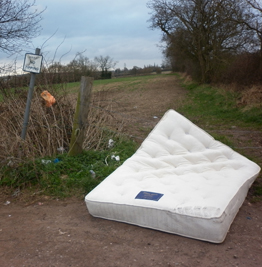The system for tackling fly-tippers is unfit for purpose. That’s according to the Local Government Association (LGA), which represents councils in England and Wales.
Local authorities tackle almost three-quarters of a million (711,000) annual fly-tipping incidents, costing over £36m – which is the on average equal to the cost of collection of waste and recycling for over half a million homes a year, the LGA says. Councils say they are now seeing some of the worst cases of fly-tipping ever. Stoke-on-Trent Council for example is fielding 400 complaints a month combating piles of dumped items such as abandoned tyres, cars and even baths. Derby City Council is setting up a night-time ‘enforcement team’ to tackle tippers.
Councils can only take fly-tippers to court and this can be the LGA says expensive, and time-consuming – often involving long investigations. Councils may be left out of pocket because courts only award partial costs. This is because they often take into account the financial means, or lack of, of the defendant and will also regard compensation as a higher priority than prosecution costs if a defendant has limited means.
The LGA wants councils to be awarded full costs and, have the flexibility of issuing on-the-spot Fixed Penalty Notices (FPNs), for some cases, rather than having to go to court, which is costly and can take months. FPNs would the association says be handed out for offences such as dumping items, such as pieces of broken furniture, old televisions and mattresses.
Councillor Peter Box, the LGA’s Environment Spokesman said: “It is utterly unacceptable and inexcusable for anyone to dump waste illegally and councils know how much people hate seeing this sort of vandalism on their doorsteps.
“Chasing down the culprits and clearing up their mess costs taxpayers tens of millions of pounds every year. Currently councils can only take fly-tippers to court rather than issuing a fine – when sometimes this is a more appropriate response – and in many cases they are unable to reclaim the full costs. Local authorities are remarkably effective and efficient in tackling fly-tipping but the current system works against them. We need a new streamlined system which helps councils and hurts those doing the dumping, one that is nimble, flexible and effective.
“All the figures show that the huge amount of effort local authorities put into preventing and tackling fly-tipping is having a real impact – but new powers would ensure it goes even further. Not only does fly-tipping create an eyesore for residents, it is also a serious public health risk, creating pollution and attracting rats and other vermin.”
Case studies
Stoke on Trent: Investigators are fielding 400 complaints a month about fly-tippers blighting the city’s streets and alleyways. Armchairs, baths, abandoned cars and old tyres are among the items being dumped in Stoke-on-Trent communities. It is costing taxpayers at least £21,000-a-month to clean up. Now Stoke-on-Trent City Council plans to name and shame the offenders as they are hauled before the courts.
Derby: A night-time ‘enforcement team’ to crack down on fly-tippers in the Normanton area has begun its work. The move has seen Derby City Council bring in, for the first time, a manned council vehicle operating between 6pm and 10pm.
North Norfolk: Investigations into a fly-tipping hotspot in – described by council officers as the worst case of fly-tipping they had seen – in north Norfolk led to the successful prosecution of two men.
The Clean Kent Campaign has been organised by Kent County Council with its 10 district, borough and city councils, Kent Police, Kent Fire and Rescue Service, and the Environment Agency. It provides advice and awareness materials to local residents and businesses.
Boston Borough Council has set up the Operation Fly Swat project to tackle fly-tipping and help rehabilitate offenders with a range of partners including the local prison, neighbouring councils, social housing providers and drainage boards. The project involved placement of offenders in the council’s Fly Swat team to help provide vocational experience and increase the council’s ability to detect and clear up fly-tip incidents
Swindon Borough Council have organised the Swindon Community Waste Partnership to carry out engagement with the community to help reduce fly-tipping and encourage residents to report litter and fly-tipping.
Bucks County Council: A fly-tipping enforcement initiative started over ten years ago has saved tax payers in Buckinghamshire over £1m.
Some statistics
The estimated cost of clearing fly-tipping to councils in England was £36.4 million in 2012/13
Local authorities dealt with more than 711,000 incidents of fly-tipping in 2012/13
Courts take into account the financial circumstances of the defendant and will also regard compensation as a higher priority than prosecution costs if a defendant has limited means. For example, Buckinghamshire Waste Partnership, comprising the county council and four district councils, only received 59 per cent (£35,000 short) of the costs of successful fly-tipping prosecutions they have brought since 2004.
Most fly-tips consisted of a small van load of material or less.
Incidents of fly-tipping on footpaths, bridleways and back alleyways increased by 10 per cent. Together these now account for 20 per cent of fly-tipping incidents
Local authorities carried out over 425,000 enforcement actions in 2012/13. The estimated cost of enforcement was £15.2 million, £2.5 million less than the previous year.
There were over 2,200 prosecutions, 99 per cent of which resulted in a conviction.
Visit: http://www.local.gov.uk/.










